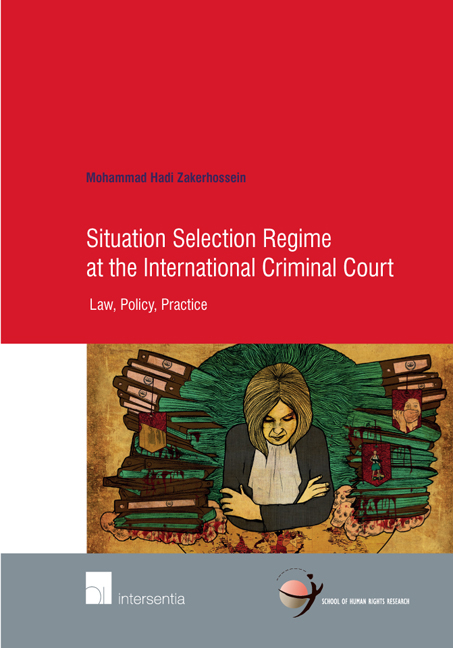Book contents
- Frontmatter
- Contents
- Acknowledgment
- Abbreviations
- General Introduction
- Part One Formulating the Concept of Situation in the Rome Statute Sense
- Chapter I Situation v. Case
- Chapter II Defining Elements of the Notion of a Situation
- Part two Situation Selection Process
- Part three Situation Selection Criteria
- Part Four Situation Selection In Light Of Expressivism
- Conclusion
- Bibliography
- ICC Case Tables
- OTP Documents
- About the Author
- School of Human Rights Research Series
Chapter I - Situation v. Case
from Part One - Formulating the Concept of Situation in the Rome Statute Sense
Published online by Cambridge University Press: 13 October 2018
- Frontmatter
- Contents
- Acknowledgment
- Abbreviations
- General Introduction
- Part One Formulating the Concept of Situation in the Rome Statute Sense
- Chapter I Situation v. Case
- Chapter II Defining Elements of the Notion of a Situation
- Part two Situation Selection Process
- Part three Situation Selection Criteria
- Part Four Situation Selection In Light Of Expressivism
- Conclusion
- Bibliography
- ICC Case Tables
- OTP Documents
- About the Author
- School of Human Rights Research Series
Summary
One method of defining a concept is to define it in an indirect manner by distinguishing the notion at hand from its parallel concepts. From such a perspective, situations might be defined by making a distinction between them and cases. The concept of case is well-known in criminal law. Domestic legal proceedings revolve around cases. The Rome Statute preserves the notion of case, but it introduces a complementary concept, namely situation. Reading the concept of situation through the lens of the case concept is misleading. Classical and conventional facts influence the shape of the understanding of new phenomenon. Because of the wide effects of the concept of situation on the work of the Court, some have advised that to ensure a coherent system, a settled view on the understanding of situations and cases is very important. This chapter seeks to draw the crucial distinction between situations and cases to avoid such misunderstanding.
DICHOTOMY BETWEEN SITUATION AND CASE
In the Rome Statute, the notion of ‘situation’ differs from the concept of ‘case’. Initially, such a distinction between cases and situations was not recognized for the ICC. The 1994 Draft Statute, which was developed by the International Law Commission (ILC), allowed States Parties to lodge complaints with respect to specific crimes, rather than entire situations. Draft Article 25(2) asserted, “a State Party which accepts the jurisdiction of the Court under Article 22 with respect to a crime may lodge a complaint with the Prosecutor alleging that such a crime appears to have been committed.” It was similar to the national criminal procedures that are triggered by lodging complaints against the accused. Nonetheless, this approach changed later, and complaints against specific cases were replaced with referrals of situations. The main reason behind this change was the concern of some delegations in the preparatory negotiations about the potential for abuse of the State Party's referrals for frivolous purposes. In fact, the ability to target specific incidents and persons could direct the Court into one-sided prosecutions and consequently could damage the reputation of the Court due to infamous selective justice. To avoid this undesirable consequence, the possibility of referring specific cases to the ICC for prosecution was rejected. That raised the question: what could serve as a satisfactory substitute for the concept of case?
- Type
- Chapter
- Information
- Situation Selection Regime at the International Criminal CourtLaw, Policy, Practice, pp. 27 - 36Publisher: IntersentiaPrint publication year: 2017



